|
Versión en español
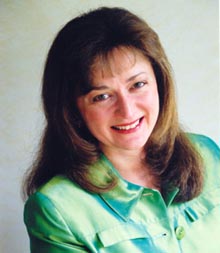
Born in London in 1963, Debbie Wiseman is working for films and TV since the 80s and she has scored more than one hundred soundtracks. She has several awards as composer and a very marked orchestral style. As she says in this interview, she would never allow an original instrument to be replaced by an artificial sound.
Madrid, October 1st 2005
BSOSpirit (BS): You started your career writing scores
for television and you keep on working on it. How was that chapter for
you?
Debbie Wiseman (DW): I started working at the BBC,
which was a great experience for any composer. I had to cope with drama
series, documentaries and comedies, providing my music very quickly, learning
on how in each production a single tempo, a unique mood, a particular music
is needed. It was certainly very challenging.
BS: 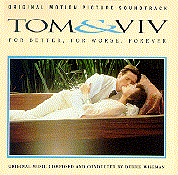 Then came Tom and Viv, an opportunity to write for the big screen. Then came Tom and Viv, an opportunity to write for the big screen.
DW: Brian Gilbert knew me in a concert I once gave, and he decided to rely on my music for his film.
BS: He must have relied indeed
in your music, because he hired you again for Wilde...
DW: Oscar Wilde was obsessed with beauty and one of my aims was for the score to be beautiful. I wrote some touchy themes for instruments such as oboe (playing Dick
Morgan), cello (Justin Pearson) and piano (Andrew Bottrill and myself). In some other scenes I used the full orchestra to emphasize the anguish Wilde endured when his fame quickly evaporated. Some of the tracks are rather sh ort, and end abruptly to match this dramatic action. ort, and end abruptly to match this dramatic action.
BS: Do you work differently
when writing for TV or for the big screen?
DW: The techniques
I use are exactly the same. There is always a story to put music in
it, and my craft is done in the same way. Some may thing that a movie
requires more a big sound than a TV series, but let me tell you that
film budgets do not allow much money to go on the music, so we composers
have to use a lot of imagination to score a scene using very few instruments...
TV stations, on the other hand, often have an orchestra of their own,
or some fix playing musicians you can turn to. However, the music for
the big screen will always be heard through loudspeakers far more powerful
than a TV, so this has also to be taken into account. You always end
up using imagination.
BS: 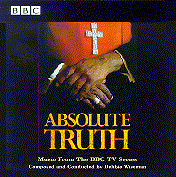 Absolute Truth was an interesting score, quite different from your previous work. Absolute Truth was an interesting score, quite different from your previous work.
DW: This was a TV series about faith and the Catholic Church. From the start, I planned to write a score based on choir voices, and I enjoyed indeed writing that music. Unfortunately, the producers didn't have the money to join the choir voices to a big orchestra, so I made them the real core of the score.
BS: W arriors had
also a very different score...
DW: arriors had
also a very different score...
DW: This was a very
interesting project. It was about the war in Bosnia, and the director
requested a very peculiar music, like any Bosnian folk-song to match
with certain dramatic sequences. The story starts without any music,
and sounds develop as the drama grows in intensity, so I had to write
that score in a very different way. It was both a challenge and a pleasure.
BS: One more strange score: Lighthouse.
DW: The film presented a frightening story about a
serial killer. I used an eerie sound, combining different instruments
to build a dark atmosphere. In fact, this was my first incursion in
action and horror cinema. I tried to write a score both sinister and
romantic.
BS:  Then you made this remarkable action movie soundtrack: ArsŤne Lupin. What happened? Did French movie-makers suddenly ran out of French composers? Then you made this remarkable action movie soundtrack: ArsŤne Lupin. What happened? Did French movie-makers suddenly ran out of French composers?
DW: Not at all. This is a thing quite common in big films which are produced by different countries. ArsŤne Lupin was funded in part by British investors, so some expenses had to go also on British movie industry. This was it with the music. I remember that Jean-Paul Salomť met me to discuss about the music. I was rather upset, because I do not know French language, and Jean-Paul couldnít speak in English either... But we succeeded in understanding each other.
It was truly an exciting project, with a lot of music 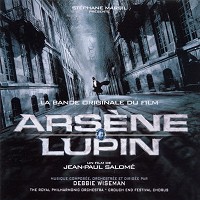 (over 90 minutes) to be put in it, with long action sequences and so on. (over 90 minutes) to be put in it, with long action sequences and so on.
The film tells the story of ArsŤne Lupin, a self-styled gentleman and thief, moving in the aristocratic circles of late 19th century in Paris. I could hire musicians from the Royal Philharmonic Orchestra and the Crouch End Festival Chorus, asking for an enlarged brass section, large-scale percussion, and solo performances of both a cimbalom and a glass harmonica... I had to work hard on a massive score for over three months.
BS: Do you feel at best composing in any particular style of music?
DW: I guess Iím rather influenced by classical music, because I was trained as a classical musician. When I write a score I try to build first a melodic main theme. To me, melody is the heart of the score, the main feature. Nevertheless, Iím always excited with challenging projects, sound experiments that develop as a real surprise.
BS: One of your latest works, Freeze
Fame, presents an intriguing soundtrack, with a dark atmosphere...
DW: Freeze
Fame was a very unusual project, a very dark film indeed.
Its main character, Sean Veil, is an ultra paranoid
murder suspect who takes to filming himself round the clock to provide
an alibi, just in case he's ever accused of another crime. Problems
arise, however, when the police do come calling and the one tape that
can prove his innocence has mysteriously disappeared. So I used my
music as a functioning rewinding tape, exploring Veilís state of mind,
without any poetic license; no woodwinds, but percussion instead.
Each instrument tries to work for a specific plan.
BS: Itís a pity that this score has not been edited yet.
DW: I understand that this is a problem with all film music. In Britain, some record companies seem bold enough to issue a CD with selected original soundtracks, but these are normally short series, short editions and they are never re-released again. I guess there will be any kind of compilation issued some of these days, including the music of Freeze Frame.
BS: 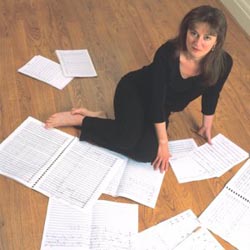 In fact, your discography has some ďgreatest hitsĒ albums. In fact, your discography has some ďgreatest hitsĒ albums.
DW: Well, this is the policy of my record company, and itís something some companies do, some others donít. They do not attempt to issue a CD with the complete score, but select some pieces of some films and develop a sort of compilation.
I suppose this isnít enough for soundtrack lovers, but I also wish I had each one of my scores edited on a CD. One thing is the film industry, and another is the record industry.
However, Iím quite sure that another score compilation will come after I write some more soundtracks to be added on.
BS: Allow me to congratulate you as well for having won an M.B.E. award last year for services brought to the British film industry.
DW: Thank you, but this is a little embarrassing... One is expected to receive this sort of award in a late career, just before leaving this world. May be Iím still too young for this honor, but I was frankly proud to have been taken into consideration.
BS: You have crafted, somehow, a style of your own in this business of scoring films. Your music goes typically assembled with precious orchestrations... You seem to reject sampled music and synthesizers.
DW: I depend on new technology to work well. I guess everyone does, these days. But I would never allow an original instrument to be replaced by an artificial sound. I only use electronic sounds when they cannot be played by any known instrument. Itís true that many film musicians tend to use sampled orchestrations instead of real ones. I understand that budget pressures can condition this, so there canít be enough money to hire a string section... However, I think that we musicians have to challenge this, use our skills to try the best with any instruments available. There are many good examples in the history of film music about composers who were clever enough to spend very limited resources in a very creative work of art... This is the magic about movies, and also about movie music.
BS: Does it bother you to be a woman composer in a world mainly made of male musicians?
DW: I never think of it. I do my work as any other composer, and I donít feel impressed by having men all around me. In fact, there is a growing number of women working in direction, production, and also playing music in an orchestra.
BS: Any new projects?
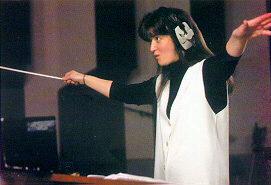 DW: :
Iím working in the score of a nice comedy which will be released in
the UK on next February. Iíve also put music to an animated film for
Channel 4, that ill be ready on next Christmas. In June, next year,
Iíll play a concert with the Royal Philharmonic Orchestra at
the Albert Hall. It will be about my film music. You
can find more information on my web site www.debbiewiseman.co.uk. DW: :
Iím working in the score of a nice comedy which will be released in
the UK on next February. Iíve also put music to an animated film for
Channel 4, that ill be ready on next Christmas. In June, next year,
Iíll play a concert with the Royal Philharmonic Orchestra at
the Albert Hall. It will be about my film music. You
can find more information on my web site www.debbiewiseman.co.uk.
BS: So this was all, Debbie. Thank you very much
DW: My pleasure, and send my best to all BSOSpirit community.
†
†
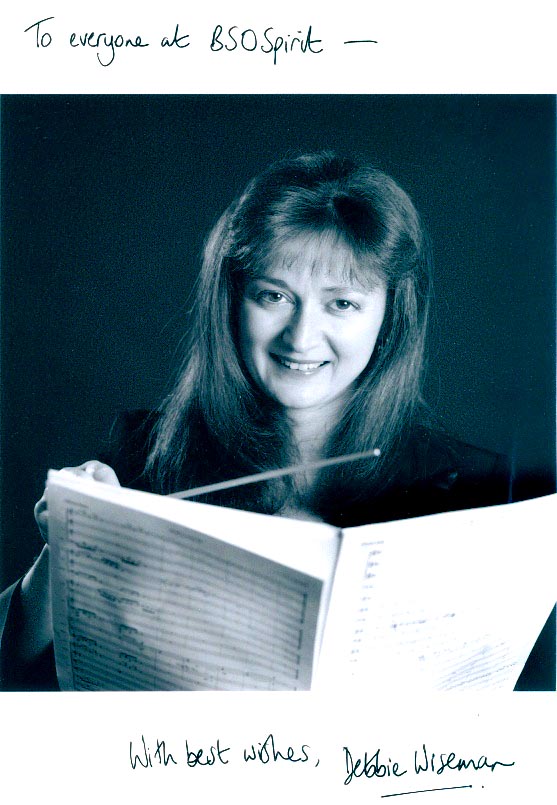
Interview made by Jose Luis DŪez Chellini
Questions by Felipe Mķgica
Transcription by Jordi Montaner
|





